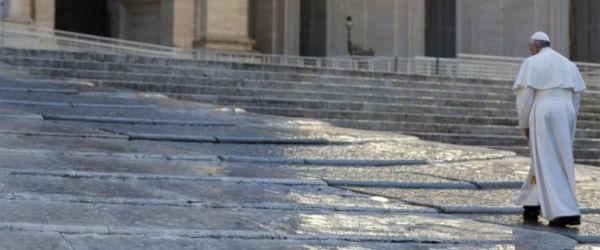An invitation to "think in a Christian manner", because "a Christian does not think only with his head, he also thinks with his heart and with the spirit within", was addressed by Pope Francis this morning, Friday 29 November, during the Mass celebrated at Santa Marta. It is a particularly timely invitation in a social context where - the Pontiff pointed out - 'weak thinking, uniform thinking, ready-to-wear thinking' is increasingly creeping in.
The Bishop of Rome focused his reflection on the Gospel passage from Luke (21:29-33) proposed during the liturgy, in which the Lord "with simple examples teaches the disciples to understand what is happening". In this case, Jesus invites them to observe "the fig tree and all the trees", because when they sprout one understands that summer is near. In other contexts the Lord uses similar examples to rebuke those Pharisees who do not want to understand "the signs of the times"; those who do not see "the step of God in history", in the history of the people of Israel, in the history of the human heart, "in the history of humanity".
The teaching, according to the Holy Father, is that "Jesus with simple words encourages us to think in order to understand". And it is an encouragement to think "not only with the head", but also "with the heart, with the spirit", with our whole self. This is precisely 'thinking in a Christian manner', to be able to 'understand the signs of the times'. And those who do not understand, as in the case of the disciples of Emmaus, are defined by Christ as "foolish and slow of heart". Because - the Pope explained - he who "does not understand the things of God is such a person", foolish and hard of understanding, while "the Lord wants us to understand what is happening in our hearts, in our lives, in the world, in history"; and to understand "what is happening now". Indeed, it is in the answers to these questions that we can detect 'the signs of the times'.
Yet this is not always the case. There is an enemy lurking. It is 'the spirit of the world', which - the Holy Father recalled - 'makes other proposals to us'. Because 'it does not want us people, it wants us mass. Without thought and without freedom'. The spirit of the world, in essence, pushes us along "a road of uniformity, but without that spirit that makes up the body of a people", treating us "as if we did not have the ability to think, as people who are not free". And in this regard, Pope Francis expressly clarified the mechanisms of covert persuasion: there is a certain way of thinking that must be imposed, "this thinking is advertised" and "one must think" in this way. It is 'uniform thinking, equal thinking, weak thinking'; a thinking that is unfortunately 'so widespread', commented the bishop of Rome.
In practice, 'the spirit of the world does not want us to ask ourselves before God: but why is this happening? And to distract us from the essential questions, "it proposes to us a ready-made way of thinking, according to our tastes: I think as I like". This way of thinking "suits" the spirit of the world; while what he "does not want is what Jesus asks of us: free thinking, the thinking of a man and a woman who are part of the people of God". After all, 'salvation was precisely this: to make us people, God's people. To have freedom'. Because "Jesus asks us to think freely, to think in order to understand what is happening".
Of course, Pope Francis warned, "alone we cannot" do everything: "we need the Lord's help, we need the Holy Spirit to understand the signs of the times". In fact, it is precisely the Spirit who gives us "the intelligence to understand". It is a personal gift given to every man, thanks to which "I must understand why this is happening to me" and "what is the way the Lord wants" for my life. Hence the concluding exhortation to "ask the Lord Jesus for the grace to send us his spirit of intelligence", so that "we do not have a weak thought, a uniform thought, a thought according to our tastes", to have instead "only a thought according to God". And "with this thinking - of mind, heart and soul - which is a gift of the Spirit", try to be able to understand "what things mean, to understand well the signs of the times."
[Pope Francis, St. Martha, in L'Osservatore Romano 30/11/2013]












